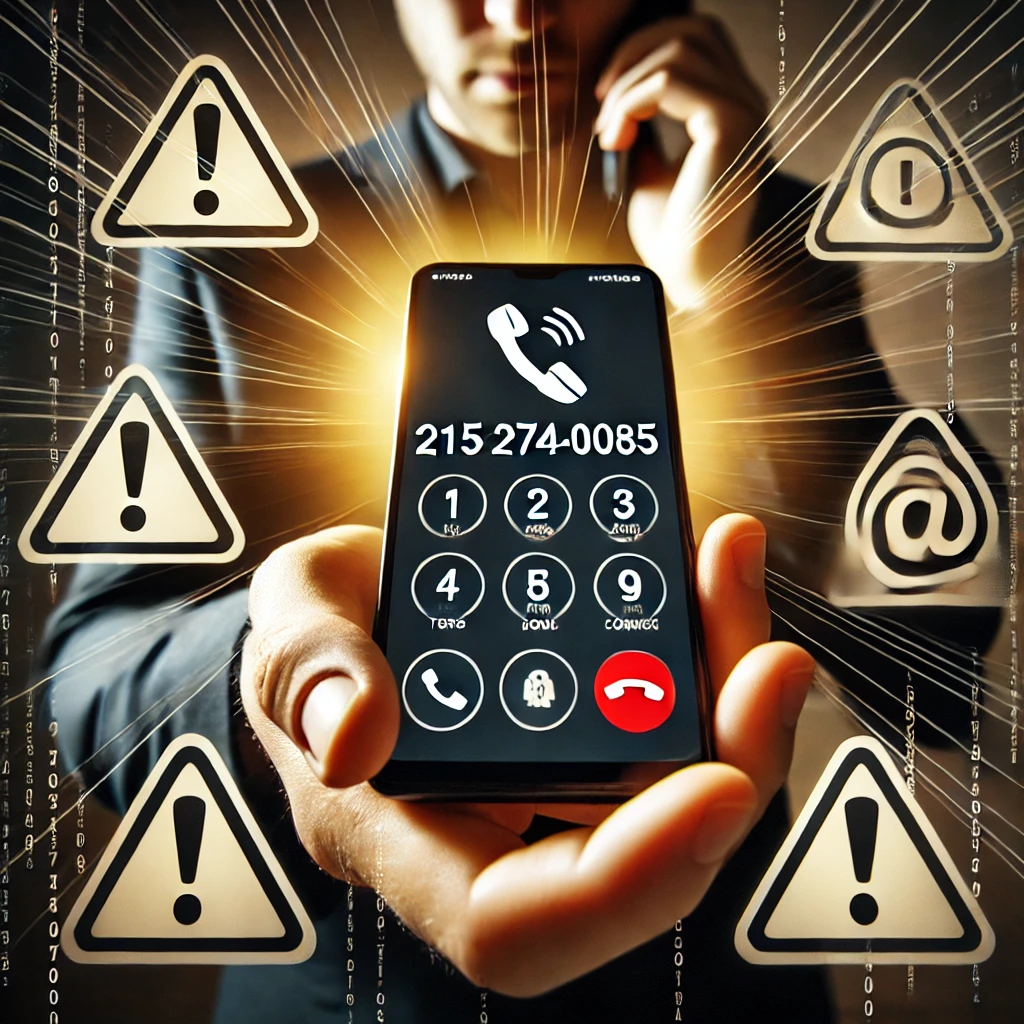Phone scams have become increasingly common, and numbers like 215-274-0085 are often used by scammers to trick unsuspecting victims. In this article, you’ll learn how these scams work, how to identify them, and the steps you can take to protect yourself and your loved ones.
How Phone Scammers Operate 215-274-0085
Psychological Manipulation Tactics
Scammers often use psychological tactics to make their calls 215-274-0085 seem urgent. They may create a sense of fear by saying you owe money or are in legal trouble, or they may use excitement by offering prizes or unexpected wealth. The goal is to make you act quickly without thinking.
Caller ID Spoofing Techniques
Scammers often use spoofing to make their call appear as if it is from a legitimate number, like 215-274-0085. This technique makes the caller ID show a familiar area code or organization, increasing the chances that you pick up.
Common Types of Phone Scams
IRS and Government Impersonation
One of the most common types of scams involves impersonating a government agency. The caller may claim to be from the IRS and say you owe back taxes, threatening arrest if you do not pay immediately.
Lottery and Prize Scams
In lottery scams, callers claim that you’ve won a large prize but need to pay a fee or provide personal information to claim it. Remember, if it sounds too good to be true, it probably is.
Tech Support Scams
Tech support scammers claim there’s a problem with your computer. They may ask you to download software or pay for fake services. This is just a trick to gain access to your computer and steal personal information.
Charity Fraud Calls
Scammers often exploit people’s generosity by posing as charities, especially after a disaster. They may use emotional stories to convince you to donate immediately.
How Scammers Obtain Personal Information
Data Breaches
Scammers often obtain personal details from data breaches. This information helps them sound more convincing when they call.
Social Media Exploitation
Scammers use social media to gather information about potential victims. If your social media profile is public, scammers can easily find your address, phone number like 215-274-0085, and other personal details.
Phishing Emails and Messages
Phishing emails and messages are another way scammers collect your personal information. They often send messages that look like they’re from trusted companies, tricking you into sharing sensitive information.
Identifying a Fraudulent Call
Red Flags to Watch For
Recognizing the signs of a scam is crucial. Here are some red flags to look out for:
- Unsolicited Calls: Calls from numbers like 215-274-0085 that you weren’t expecting.
- Requests for Immediate Payment: Scammers will often ask for payment in gift cards or wire transfers.
- Suspicious Caller ID: Even if the caller ID appears legitimate, it could be spoofed.
Examples of Suspicious Caller Behavior
Scammers often pressure you to act quickly or threaten you with severe consequences. They may ask for personal information like your Social Security number like 215-274-0085 or bank details. Always be cautious if something feels off.
How to Protect Yourself from Phone Scams
Recognizing Suspicious Patterns
Be alert for unusual patterns. For instance, repeated calls from the same number, such as 215-274-0085, could indicate a scam. If a caller asks for personal information without prior communication, it’s likely fraudulent.
Steps to Take When You Receive a Suspicious Call
- Hang Up Immediately: If you suspect it’s a scam, hang up. Don’t engage with the caller.
- Verify the Caller: Contact the supposed organization using a verified number, not the one provided by the caller.
Best Practices for Protection
Screening and Blocking Calls
Screen unknown numbers like 215-274-0085. If you don’t recognize the number, let it go to voicemail. Legitimate callers will leave a message.
Using Call-Blocking Apps and Carrier Services
Use call-blocking apps and carrier services to block suspicious calls. Apps like Hiya, Nomorobo, and Truecaller can help prevent calls from scam numbers like 215-274-0085.
Avoiding Sharing Personal Information
Never share personal information, such as credit card numbers or Social Security numbers, over the phone unless you are sure of the caller’s identity.
Trusting Your Instincts
If a call doesn’t feel right, trust your instincts. Scammers often try to create pressure; if you feel rushed, take a step back.
Protecting Your Digital Footprint
Social Media Safety Tips
Limit the amount of personal information you share on social media. Set your profiles to private and avoid sharing your phone number like 215-274-0085 or home address.
Monitoring Financial Accounts
Regularly monitor your bank and credit card statements for any suspicious transactions. Quick action can help prevent further financial loss.
Two-Factor Authentication
Enable two-factor authentication for your online accounts. This adds an extra layer of security, making it harder for scammers to gain access.
What to Do If You’ve Been Targeted
Immediate Actions to Take
- Hang Up: As soon as you realize it’s a scam, hang up.
- Document the Details: Note down the number, like 215-274-0085, and any information provided by the scammer.
Steps to Document and Report the Scam
Report the scam to the relevant authorities, such as the Federal Trade Commission (FTC) or the Federal Communications Commission (FCC). This helps prevent others from becoming victims.
How to Report Fraudulent Calls
Reporting to FTC and FCC
The FTC and FCC are responsible for tracking and investigating scam calls. Report scams through their official websites to contribute to scam prevention efforts.
Contacting Your Phone Carrier
Phone carriers can also help by blocking scam numbers like 215-274-0085. Contact your carrier and report the suspicious number.
Involving Local Law Enforcement
Local police may not always act on scam calls directly, but they can document the incident and guide you on additional safety measures.
Defending Against Future Scams
Using Call-Blocking Technology
Technology is one of the best defenses against scams. Call-blocking services provided by carriers like Verizon’s “Call Filter” or AT&T’s “Call Protect” can block numbers like 215-274-0085.
Popular Apps and Carrier Tools
- Hiya: Blocks known scam numbers in real-time.
- Nomorobo: Automatically blocks robocalls.
- Truecaller: Identifies and blocks scam calls using community reports.
Legal Protections and Recourse
Understanding the TCPA
The Telephone Consumer Protection Act (TCPA) regulates unwanted calls. If you receive illegal calls, you may be entitled to compensation.
How to Recover Lost Funds
If you’ve been scammed, contact your bank or credit card company immediately. Quick action may help recover your money.
Real-Life Case Studies
Examples of Common Scams
For instance, scammers using numbers like 215-274-0085 often impersonate government officials or promise large winnings. Real-life examples help illustrate the importance of caution.
Lessons Learned from Victims
Victims often report feeling pressured to act quickly. Learning from their experiences can help others avoid similar situations.
Conclusion
Phone scams are a growing problem, and numbers like 215-274-0085 are part of this ongoing threat. By staying vigilant, using call-blocking technology, and reporting suspicious activity, you can protect yourself and others. Stay informed and share this information with your loved ones to prevent future scams.
FAQs
1. How can I tell if a call from 215-274-0085 is a scam?
If the caller pressures you for personal information or immediate payment, it’s likely a scam. Always verify the caller’s identity.
2. What should I do if I receive a scam call?
Hang up immediately and report the number to the FTC or FCC. Do not provide any personal information.
3. Can call-blocking apps help prevent scam calls?
Yes, call-blocking apps like Hiya, Nomorobo, and Truecaller are effective in blocking scam calls from numbers like 215-274-0085.
4. Is it safe to call back a suspicious number like 215-274-0085?
No, it’s not recommended to call back suspicious numbers, as this could confirm your number to scammers and lead to further attempts.
5. How can I report a scam call?
You can report scam calls to the FTC, FCC, your phone carrier, or local law enforcement to help combat these scams.



